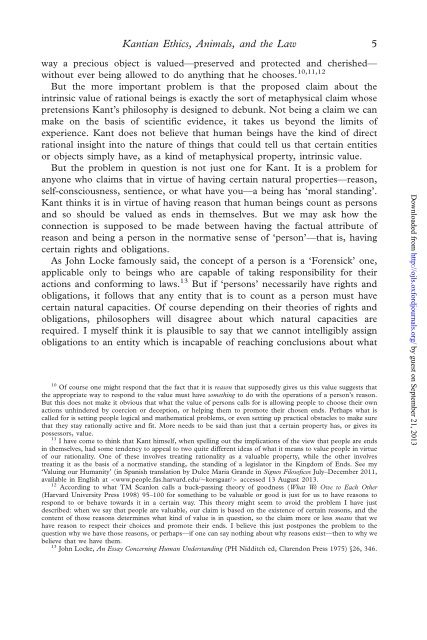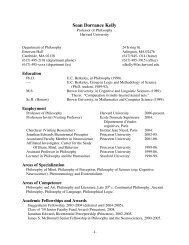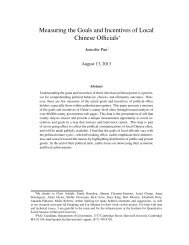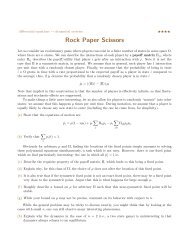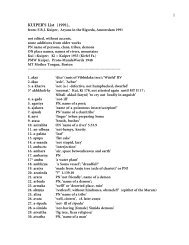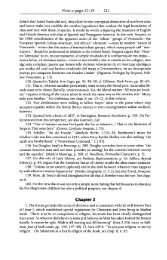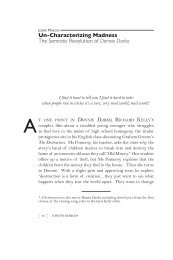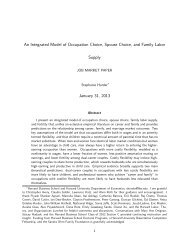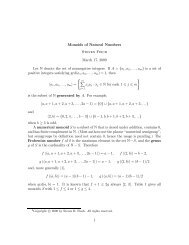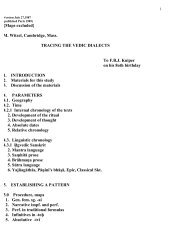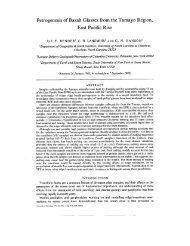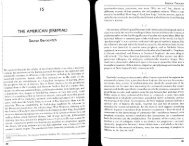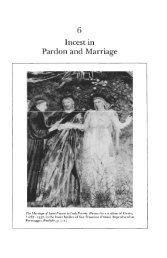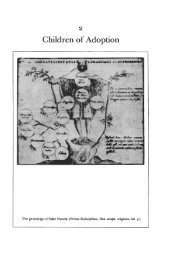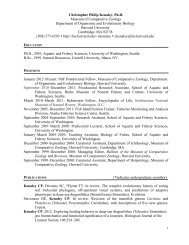Kantian Ethics, Animals, and the Law - People.fas.harvard.edu
Kantian Ethics, Animals, and the Law - People.fas.harvard.edu
Kantian Ethics, Animals, and the Law - People.fas.harvard.edu
Create successful ePaper yourself
Turn your PDF publications into a flip-book with our unique Google optimized e-Paper software.
<strong>Kantian</strong> <strong>Ethics</strong>, <strong>Animals</strong>, <strong>and</strong> <strong>the</strong> <strong>Law</strong> 5<br />
way a precious object is valued—preserved <strong>and</strong> protected <strong>and</strong> cherished—<br />
without ever being allowed to do anything that he chooses. 10,11,12<br />
But <strong>the</strong> more important problem is that <strong>the</strong> proposed claim about <strong>the</strong><br />
intrinsic value of rational beings is exactly <strong>the</strong> sort of metaphysical claim whose<br />
pretensions Kant’s philosophy is designed to debunk. Not being a claim we can<br />
make on <strong>the</strong> basis of scientific evidence, it takes us beyond <strong>the</strong> limits of<br />
experience. Kant does not believe that human beings have <strong>the</strong> kind of direct<br />
rational insight into <strong>the</strong> nature of things that could tell us that certain entities<br />
or objects simply have, as a kind of metaphysical property, intrinsic value.<br />
But <strong>the</strong> problem in question is not just one for Kant. It is a problem for<br />
anyone who claims that in virtue of having certain natural properties—reason,<br />
self-consciousness, sentience, or what have you—a being has ‘moral st<strong>and</strong>ing’.<br />
Kant thinks it is in virtue of having reason that human beings count as persons<br />
<strong>and</strong> so should be valued as ends in <strong>the</strong>mselves. But we may ask how <strong>the</strong><br />
connection is supposed to be made between having <strong>the</strong> factual attribute of<br />
reason <strong>and</strong> being a person in <strong>the</strong> normative sense of ‘person’—that is, having<br />
certain rights <strong>and</strong> obligations.<br />
As John Locke famously said, <strong>the</strong> concept of a person is a ‘Forensick’ one,<br />
applicable only to beings who are capable of taking responsibility for <strong>the</strong>ir<br />
actions <strong>and</strong> conforming to laws. 13 But if ‘persons’ necessarily have rights <strong>and</strong><br />
obligations, it follows that any entity that is to count as a person must have<br />
certain natural capacities. Of course depending on <strong>the</strong>ir <strong>the</strong>ories of rights <strong>and</strong><br />
obligations, philosophers will disagree about which natural capacities are<br />
required. I myself think it is plausible to say that we cannot intelligibly assign<br />
obligations to an entity which is incapable of reaching conclusions about what<br />
10 Of course one might respond that <strong>the</strong> fact that it is reason that supposedly gives us this value suggests that<br />
<strong>the</strong> appropriate way to respond to <strong>the</strong> value must have something to do with <strong>the</strong> operations of a person’s reason.<br />
But this does not make it obvious that what <strong>the</strong> value of persons calls for is allowing people to choose <strong>the</strong>ir own<br />
actions unhindered by coercion or deception, or helping <strong>the</strong>m to promote <strong>the</strong>ir chosen ends. Perhaps what is<br />
called for is setting people logical <strong>and</strong> ma<strong>the</strong>matical problems, or even setting up practical obstacles to make sure<br />
that <strong>the</strong>y stay rationally active <strong>and</strong> fit. More needs to be said than just that a certain property has, or gives its<br />
possessors, value.<br />
11 I have come to think that Kant himself, when spelling out <strong>the</strong> implications of <strong>the</strong> view that people are ends<br />
in <strong>the</strong>mselves, had some tendency to appeal to two quite different ideas of what it means to value people in virtue<br />
of our rationality. One of <strong>the</strong>se involves treating rationality as a valuable property, while <strong>the</strong> o<strong>the</strong>r involves<br />
treating it as <strong>the</strong> basis of a normative st<strong>and</strong>ing, <strong>the</strong> st<strong>and</strong>ing of a legislator in <strong>the</strong> Kingdom of Ends. See my<br />
‘Valuing our Humanity’ (in Spanish translation by Dulce María Gr<strong>and</strong>e in Signos Filosoficos July–December 2011,<br />
available in English at accessed 13 August 2013.<br />
12 According to what TM Scanlon calls a buck-passing <strong>the</strong>ory of goodness (What We Owe to Each O<strong>the</strong>r<br />
(Harvard University Press 1998) 95–100 for something to be valuable or good is just for us to have reasons to<br />
respond to or behave towards it in a certain way. This <strong>the</strong>ory might seem to avoid <strong>the</strong> problem I have just<br />
described: when we say that people are valuable, our claim is based on <strong>the</strong> existence of certain reasons, <strong>and</strong> <strong>the</strong><br />
content of those reasons determines what kind of value is in question, so <strong>the</strong> claim more or less means that we<br />
have reason to respect <strong>the</strong>ir choices <strong>and</strong> promote <strong>the</strong>ir ends. I believe this just postpones <strong>the</strong> problem to <strong>the</strong><br />
question why we have those reasons, or perhaps—if one can say nothing about why reasons exist—<strong>the</strong>n to why we<br />
believe that we have <strong>the</strong>m.<br />
13 John Locke, An Essay Concerning Human Underst<strong>and</strong>ing (PH Nidditch ed, Clarendon Press 1975) §26, 346.<br />
Downloaded from http://ojls.oxfordjournals.org/ by guest on September 21, 2013


